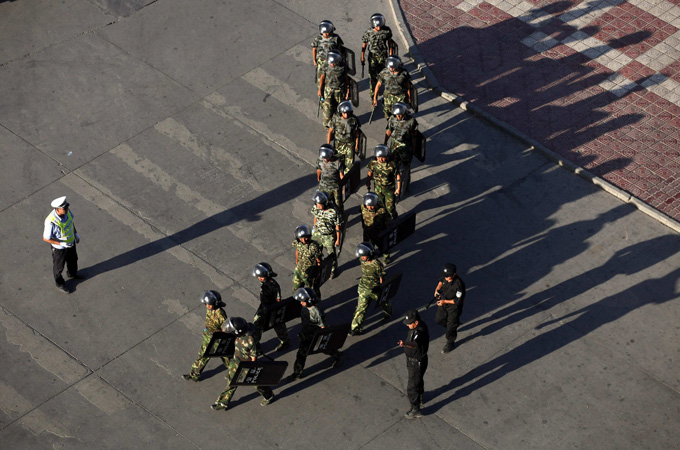China’s Xinjiang ‘terrorism’ claim questioned
Experts say state policies towards region’s ethnic Uighur Muslims, not “Islamic extremism”, at root of violence.

 |
| China has ordered a full-scale security clampdown on Xinjiang after the latest outbreak of violence [Reuters] |
Experts have questioned the Chinese government’s claim that recent attacks in the Xinjiang region were planned abroad by “Islamic extremists”.
Analysts and Xinjiang experts said on Friday there is no evidence that Chinese Muslim groups had been trained in Pakistan and Afghanistan to carry out the attacks.
Last weekend, ethnic Uighur assailants stormed a restaurant in the city of Kashgar, a city in Xinjiang, killing the owner and a waiter, and then hacking four people to death on a nearby street.
According to state media, at least 14 people were killed and 42 injured in two separate incidents.
The attacks were the latest in several bursts of violence that have jolted Xinjiang – where many Uighurs, a predominantly Muslim Turkic-speaking people, resent the influx of Han Chinese.
The Chinese government blamed the attacks on Muslim fighters and responded by ordering a full-scale security clampdown on Xinjiang.
“Those criminals who dare to test the law and commit violent terrorist acts will be shown no leniency, no appeasement and no soft heart,” Meng Jianzhu, the public security minister, said on Thursday.
Meng made the comments, posted on the government’s website , during an anti-terrorism meeting in Xinjiang’s capital, Urumqi.
“Recent occurrences of violent terrorist crimes in Xinjiang have caused numerous casualties among innocent people, and seriously impacted Xinjiang’s economic and social development and ethnic unity,” he said.
Those words were the closet Meng came to explicitly referring to the weekend’s violence. He avoided any mention of Pakistan, where China had said that separatist groups receive training.
Experts sceptical
China has blamed the surge in violence on the East Turkistan Islamic Movement (ETIM), who it says trains in Pakistan – an ally of China.
Analysts and Uighur activists confirm that Chinese Muslim activists have been to Taliban-controlled regions of Pakistan and Afghanistan, but say there is no evidence that they are being trained to carry out attacks in China.
“I don’t think there is any reason to assume that any organization is orchestrating. Barring any evidence, it’s ridiculous to make such a claim,” Dru Gladney, an expert on Xinjiang politics at the US-based Pacific Basin Institute, said.
In fact, some experts even question whether the ETIM is still active.
“I have seen no irrefutable evidence that ETIM still exists … or that it is responsible for the recent round of violence,” Gardner Bovingdon, a professor of Central Asian studies at Indiana University, said.
Bovingdon is the author of a history of the Uighur struggle.
Overseas Uighur activists say that China’s claim of “Islamic terrorism” is a smokescreen designed to obscure the true reasons for which some have turned to violence.
Many Uighurs complain of discrimination in the job market, and say government efforts to boost development in Xinjiang have mainly benefited the Han majority, and attracted more to move there.
Furthermore, many are angry about tightened restrictions on their culture, religion and language.
Since 2009’s Urumqi riots, the Chinese government has imposed a series of oppressive policies on the Uighur community – restricting everything from mosque attendance to fasting during the holy month of Ramadan.